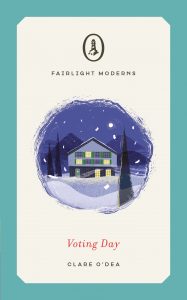Rich Inspiration for a Swiss Story
By Clare O’Dea
 Imagine if you could speak to a time traveller? Well, you can. If you want to know what it was like to live in 1950s Switzerland, as I did, you can ask the people who were there. It’s wonderful.
Imagine if you could speak to a time traveller? Well, you can. If you want to know what it was like to live in 1950s Switzerland, as I did, you can ask the people who were there. It’s wonderful.
Always a compulsive story collector, I never miss a chance to find out about someone’s past. Some of this story collecting I’ve done as part of my work as a journalist, but a lot of it happens naturally in my daily life.
It’s not really the Swiss way to be nosy but I get away with it as an outsider. People are happy to share and I am happy to listen.
My novel takes place on February 1, 1959, the day Swiss men voted ‘no’ to granting women the vote (They eventually voted ‘yes’ in 1971). The inspiration for the book was all around. It reached critical mass one day on a walk in the forest, and Voting Day was born.
The idea of setting a novel over the course of a day is well tested in literature – from Ulysses to A Day in the Life of Ivan Denisovich to a recent favourite of mine, Summerwater by Sarah Moss. The day can be as wide or deep as the writer wishes.
From the beginning I wanted Voting Day to be a women’s narrative featuring four different voices, with the action passing from one to the other as the day goes on. The key element that linked their individual stories and gave shape to the whole wasn’t obvious to me at first; it emerged during the writing process.
It might seem strange that three of the four main characters in the novel have little or no interest in the vote on women’s suffrage. But that is realistic.
Apart from being busy doing low paid or unpaid work and lacking education, most Swiss women at that time were conditioned to accept strict gender roles as the natural order of things. The world of politics was alien to them and public life was a male preserve.
I’d first really thought about the 1959 vote when I interviewed the suffragist Marthe Gosteli (1917-2017) for my non-fiction book about Switzerland, which included a chapter about the position of women.
She was elderly and infirm when I visited her at home near Bern but her steely resolve and intelligence were undiminished. When she talked about the disappointment she and her fellow campaigners felt when the result came in, I really listened. I tried to imagine what it felt like – the rejection, the loss of hope.
Not long after that meeting, I came across a book by another Swiss woman of the same generation, Iris von Roten (1917-1990). She’s known as the Swiss De Beauvoir but – unbelievably – her landmark 1958 book, Frauen im Laufgitter (Women in the Playpen), has never been translated into English. Fired up by this injustice, I tried to get a translation project off the ground but unfortunately it didn’t work out, and I was frustrated that I had wasted my time.
As it turned out, the work was not wasted. The pages I translated about the working conditions for different women’s jobs came in very useful in providing rich contemporary detail for my characters’ lives in Voting Day – farmer’s wife, office girl (to use the parlance of the day), cleaner and hospital administrator.
I’ve met many other time travellers. The area where I live in the canton of Fribourg, near the rural Swiss-German part, was very poor in living memory and at least as gloomily Catholic as Ireland. I’ve heard many first-hand stories of hardship.
Once, when my twins were babies, a woman in her fifties stopped me on the street to admire them and chat. She told me she was also a twin but that she had grown up in a children’s home. Her mother couldn’t manage two babies on top of everything else so she gave up one of her daughters. The woman said she always wondered – why me?
There was also the official practice of placing children from institutions with farming families where they could make themselves useful. The foster children were often stigmatised in the community because of their poverty or parentage. Many were ill-treated.
This practice was common and continued up to the 1960s when ideas about childhood began to change, coinciding with increasing mechanisation on farms. Unmarried mothers or young women deemed to be ‘licentious’ also came in for harsh treatment, sanctioned by the law. The tyranny of respectability.
When I covered historical injustices in the care system as a journalist, I felt deeply sorry for the survivors. Even in the less severe cases, where ‘nothing bad’ happened, there was the pain of being looked down upon, of growing up without love or protection. I ended up writing about one such child in Voting Day.
By the time I sat down to write, I felt familiar with the life and times of my characters. I knew what their homes looked like inside, what they ate, how they spoke and what their worries were. I was also able to borrow from the traces of the past that are still visible today.
It has taken almost two decades of living in Switzerland to bring me close enough to inhabit Swiss characters. Once I set the story in motion, I only had to follow and see what they would reveal. What have I learned? How difficult it is for us as humans to truly see and accept each other. How easy it is to make a difference when we do.
—
Originally from Dublin, Clare O’Dea has lived in Switzerland since 2003. She is the author of two non-fiction books. Voting Day (Fairlight Books, 2022) is her first novel. Voting Day by Clare O’Dea – Fairlight Moderns | Fairlight Books
VOTING DAY
 In February 1959, Switzerland held a referendum on women’s suffrage. The men voted ‘no’.
In February 1959, Switzerland held a referendum on women’s suffrage. The men voted ‘no’.
In this powerful novella, Clare O’Dea explores that day through the eyes of four very different Swiss women. Vreni is a busy farmer’s wife, longing for a break from family life. Her grown-up daughter Margrit is carving out an independent life in Bern, but finds herself trapped in an alarming situation. Esther, a cleaner, is desperate to recover her son who has been taken into care. Beatrice, a hospital administrator, has been throwing herself into the ‘yes’ campaign. The four women’s paths intersect on a day that will leave its mark on all their lives.
Pre-order Now
Category: On Writing
























